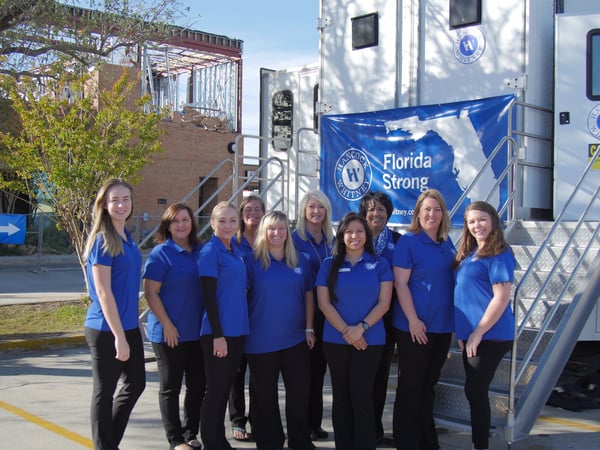Today marks the start of the 2019 Atlantic Hurricane Season. This six-month stretch between June and November has a special significance here across the Gulf South. As part of our commitment to our clients and communities, we want to help you plan, prepare and protect before the storm clouds gather.
We’ve seen it all—wind, storm surge, flooding; and while no one can predict the impact of a natural disaster, you can take precautions now to ensure your property and finances are storm-ready.
Through our recent hurricane experiences and those we’ve faced throughout our history, we know it only takes one storm to change our communities drastically. We understand the importance of proactive preparation and have compiled some of the lessons learned and best practices we’ve seen make a difference in storm preparation and recovery across our footprint.
 A temporary mobile unit operates on the site of our Panama City Financial Center which was destroyed during the intense winds from Hurricane Michael in October 2018.
A temporary mobile unit operates on the site of our Panama City Financial Center which was destroyed during the intense winds from Hurricane Michael in October 2018.
Here are seven ways to plan, prepare and protect this hurricane season:
1. Safeguard financial documents: In the event of a disaster, you’ll need identification and important documents to begin the recovery process. Consider creating digital copies of important documents (i.e. car titles, deeds, insurance declaration pages, etc.) on a laptop, mobile device, and/or password-protected flash drive. Even if you keep your documents in a safety deposit box, have digital backups. If your financial institution’s building sustains damage from a storm, you may be delayed in accessing your box.
2. Review the details of your insurance policy: Talk with your agent to determine if you have adequate coverage or if you need to reassess your plan. Spend some time understanding your deductible; some policies have a higher deductible for hurricane damage. Also remember that standard homeowners insurance doesn’t cover flooding. Whether you’re a homeowner or renter, you’ll need a separate policy that can be obtained through your insurance company or the National Flood Insurance Program at www.floodsmart.gov. Act now, as flood insurance requires a 30-day waiting period before the policy goes into effect.
3. Document your personal assets: Take updated interior and exterior photos of homes and several photos of automobiles to verify pre-storm condition. Keep both digital and print photos in your files. It’s also helpful to time-and date-stamp photos or take home photos with the TV turned to an all-news channel that shows the date and time. This invaluable documentation will help jump-start the claims process following a storm.
4. Enroll in online and mobile banking: To have access to your accounts anywhere, enroll in Hancock Whitney's Online and Mobile Banking. Services like electronic bill pay, funds transfers, direct deposit and account alerts can help you stay on top of your finances and ahead of late fees.
5. Have an emergency fund: Withdraw cash, especially small bills, to have on hand for necessities. Also consider having a credit card specifically for emergencies. It may help you document disaster-related expenses for reporting and insurance purposes.
6. Create a communications plan: Make sure to have updated emails and cell numbers for all important contacts: emergency contacts and family members; insurance agents and help lines; emergency response centers or assistance organizations such as Red Cross; and key employees (for business owners).
7. Engage social media: If you use social media, follow @HancockWhitney for up-to-date information on financial center closings and re-openings, disaster assistance and resources. In the event of a storm, make sure your profiles are updated and use the emergency functions several sites engage during crises. Use caution, though, in posting too much information to avoid inadvertently letting would-be criminals know your whereabouts or that you’re not at home.
Basic personal preparedness is also vital when storms threaten, and we recommend checking out the hurricane playbook our friends at ready.gov put together which includes information on disaster supply kits, evacuation details and more.
With hurricane season upon us, now is the time to lay the groundwork that can help make you more resilient to a storm’s impacts. You can rest assured that Hancock Whitney is prepared to weather the storms that may come our way. We’re here to help you prepare and will be here to help if disaster strikes.





